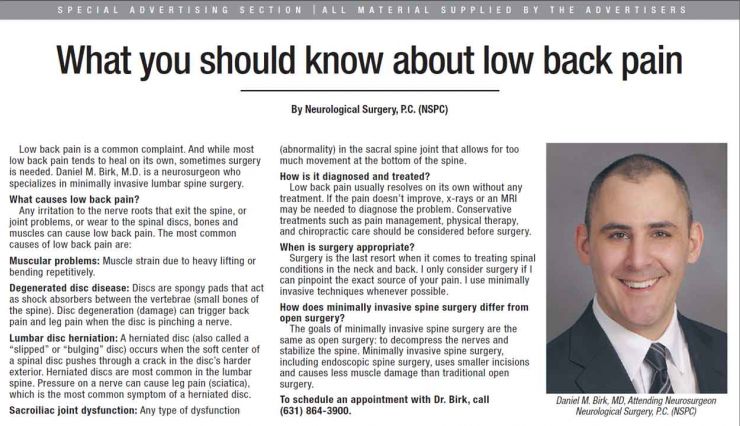November 2020 - As seen in

By Neurological Surgery, P.C. (NSPC)
Low back pain is a common complaint. And while most low back pain tends to heal on its own, sometimes surgery is needed. Daniel M. Birk, M.D. is a neurosurgeon who specializes in minimally invasive lumbar spine surgery.
What causes low back pain?
Any irritation to the nerve roots that exit the spine, or joint problems, or wear to the spinal discs, bones and muscles can cause low back pain. The most common causes of low back pain are:
Muscular problems: Muscle strain due to heavy lifting or bending repetitively.
Degenerated disc disease: Discs are spongy pads that act as shock absorbers between the vertebrae (small bones of the spine). Disc degeneration (damage) can trigger back pain and leg pain when the disc is pinching a nerve.
Lumbar disc herniation: A herniated disc (also called a “slipped” or “bulging” disc) occurs when the soft center of a spinal disc pushes through a crack in the disc’s harder exterior. Herniated discs are most common in the lumbar spine. Pressure on a nerve can cause leg pain (sciatica), which is the most common symptom of a herniated disc.
Sacroiliac joint dysfunction: Any type of dysfunction (abnormality) in the sacral spine joint that allows for too much movement at the bottom of the spine.
How is it diagnosed and treated?
Low back pain usually resolves on its own without any treatment. If the pain doesn’t improve, x-rays or an MRI may be needed to diagnose the problem. Conservative treatments such as pain management, physical therapy, and chiropractic care should be considered before surgery.
When is surgery appropriate?
Surgery is the last resort when it comes to treating spinal conditions in the neck and back. I only consider surgery if I can pinpoint the exact source of your pain. I use minimally invasive techniques whenever possible.
How does minimally invasive spine surgery differ from open surgery?
The goals of minimally invasive spine surgery are the same as open surgery: to decompress the nerves and stabilize the spine. Minimally invasive spine surgery, including endoscopic spine surgery, uses smaller incisions and causes less muscle damage than traditional open surgery.
To schedule an appointment with Dr. Birk, call(631) 864-3900.
